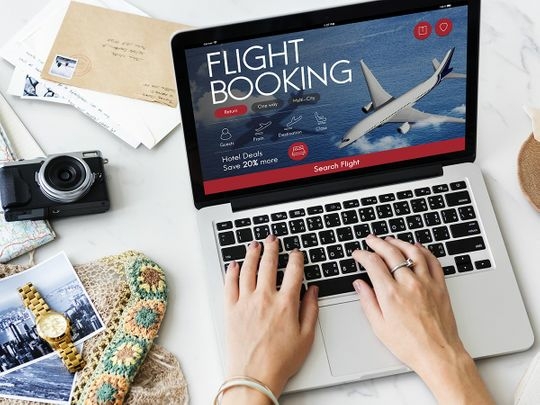Dubai: Are you planning a last-minute vacation but don’t have enough savings to fund the trip? ‘Fly Now, Pay Later’ plans, offered by airlines across the world, can help you make a stringent travel budget more flexible by giving you extra time to gather the savings needed for the trip.
But from a financial standpoint, are they truly cost-effective and risk-free? Not always, reveal UAE-based travel experts and financial planners. Let’s delve into not just the perks of paying for your tickets down the line, but also potential risks that can hurt your financial health as well.
“To reduce the burden on tourists, many finance companies have tied up with airlines to promote ‘Fly Now, Pay Later’ (FNPL) or ‘Travel Now, Pay Later’ (TNPL) schemes,” said Dubai-based travel agent and itinerary consultant Richa Dev. “It is the travel version of ‘Buy Now, Pay Later (BNPL)’.
“With ‘Fly Now, Pay Later’ financing schemes, you are given an option to pay for your travel-related booking reservations without costing anything out-of-pocket. If paid within the specified time frame, most of these loans come with zero interest. But if you miss a payment, you’re charged interest.”
How does ‘Fly Now, Pay Later’ (FNPL) differ from ‘Buy Now, Pay Later’ (BNPL) schemes?
With ‘FNPL’, you can either pay partially or not at all while booking, and you can choose to do so later within a specified duration. Often times, you can avail ‘no-cost EMIs’ or pay interest on the borrowed amount depending on the amount and the duration for which you are taking travel funds.
(‘No-cost EMIs’ are a type of payment facility where you convert the cost of your products into easy monthly instalments and pay nothing over the agreed purchase price. With this EMI scheme, you incur no additional monthly interest charges. It is also referred to as zero cost or interest-free EMI.)
How do ‘Travel Now, Pay Later’ payment schemes work?
“Online travelling agencies are either tied up with banks, FinTech companies, loan apps, third-party lenders or offer credit through their own FinTech division,” explained Sophia Sanchez, travel planning manager at a UAE-based European tour operator.
“In this kind of financing scheme, the disbursements are broken down into small amounts and divided into a series of payments – thereby providing flexibility to stringent shoppers. You must make the first payment when you book a ticket or check out of the hotel when travelling.”
Here’s an example: Let’s say you want to book your trip through a travel agency, and this agency has partnered with a variety of financial institutions to offer ‘FNPL’ payment schemes on your trip costs with a ‘no-cost EMI’ for a limited time.
“The key advantage for an impromptu traveller who makes use of ‘FNPL’ payment schemes is that once the booking is complete, you can set off on your trip without paying anything to a travel agency. The payment cycle starts only after you have completed the trip,” added Dev.
Image Credit:
Qualifying for a yearly zero percent interest offer can help
“You would benefit more if you qualify for an introductory offer of a zero per cent yearly interest, which your lender or your travel partner will provide you with such an offer if you have a strong credit profile.”
Sanchez and Dev also cautioned travellers to not consider ‘FNPL’ plans as means to risk- or cost-free travel and advised having backup funds so you can easily pay off the loan on time without incurring any penalty or interest.
“If handled prudently, the FNPL initiative has consistently helped low-to-medium income individuals and families by spreading the cost of their air ticket over a period of, say, three months or even five years,” added Sanchez, when describing how the scheme has helped customers who she deals with.
“We understand travel can be a significant expense, especially for families and those on a tight budget, so this is a cost-effective way for people to book and enjoy their travel without having to worry about paying in one large sum. But it also comes with downsides.”
What are the risks to using ‘Fly Now, Pay Later’ (FNPL) schemes?
‘Fly Now, Pay Later’ schemes can entail confusing terms, challenges in filing and resolving disputes, and strict requirements. And since it can encourage shoppers to take on more debt than they can afford, these schemes may sometimes do more harm than good, many experts say.
“A key problem with FNPL travel payment schemes is the exorbitant charge for late payments. Many FNPL services charge late fees, typically around $8 (Dh30) worldwide. According to certain statistics, 10.5 per cent of FNPL borrowers were charged at least one late fee in 2021,” noted Dev.
“Also, some FNPL loans require ‘autopay’, which can be problematic for people who have insufficient funds in their connected payment accounts, as they could incur a late fee from the FNPL issuer, as well as an ‘overdraft’ fee from their bank.”
Glossary: Autopay, Overdraft
When a bank account enters a negative balance, you will be able to access a predetermined loan – or overdraft – provided by the bank and be charged a fee. The amount of the overdraft fee varies from bank to bank. On average the fee is about $35 (Dh128), but it could be anywhere from $10 (Dh36.7).
Studies have also previously indicated how in the past years most ‘pay later’ services like FNPL or BNPL likely encourages even more spending. And this type of overextension consequently threatens to put your financial health at risk.
Image Credit:
Bottom line?
‘Fly Now, Pay Later’ is a payment-deferral feature that primarily attracts those who usually does not have a credit card or have fairly a lesser-credit history. If you’re a travel enthusiast who makes impromptu plans and often finds it hard to have adequate funds, FNPL option might seem lucrative.
If paid off on time, interest-free FNPL purchases provide an affordable alternative to credit cards, which typically charge interest on outstanding balances. Given the clear payment dates and fixed amounts, such services may help with budgeting. For others, it can free up cash flow.
“While the repayment can be done in up to 30 days depending on the user policy under which the customer is on boarded, if the customers choose to pay via EMIs, interest is may be applicable, ranging from 24-36 per cent per year, which is significant,” added Sanchez.
Other risks to factor in include elevated interest rates, non-refundable deposits, and hidden charges for alterations in plans. “When booking a trip, many companies require an upfront payment, usually a percentage of the total cost, which is non-refundable,” explained Dev.
“So if the traveller decides not to go on the trip or make changes to your plans, they won’t get that deposit back. Additionally, they might be subject to additional fees or penalties for cancellations or alterations. So bear these in mind when using the easy payment option.”




